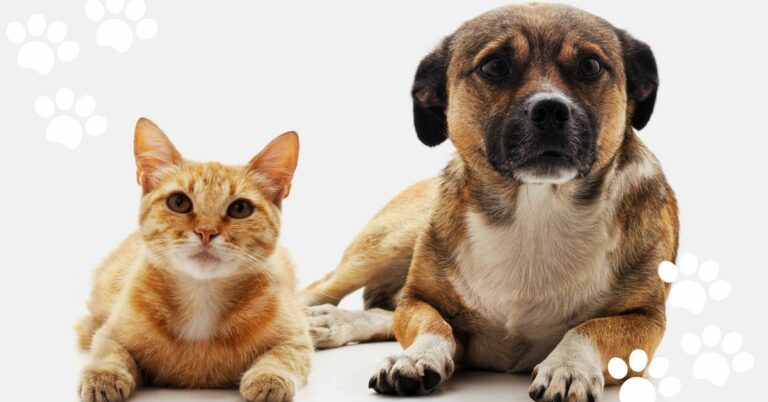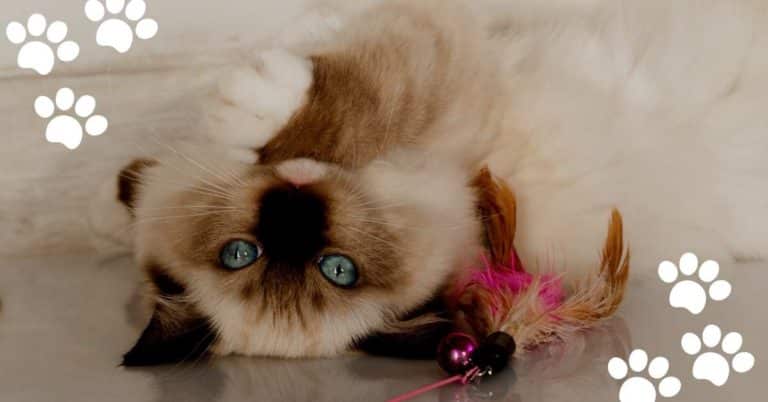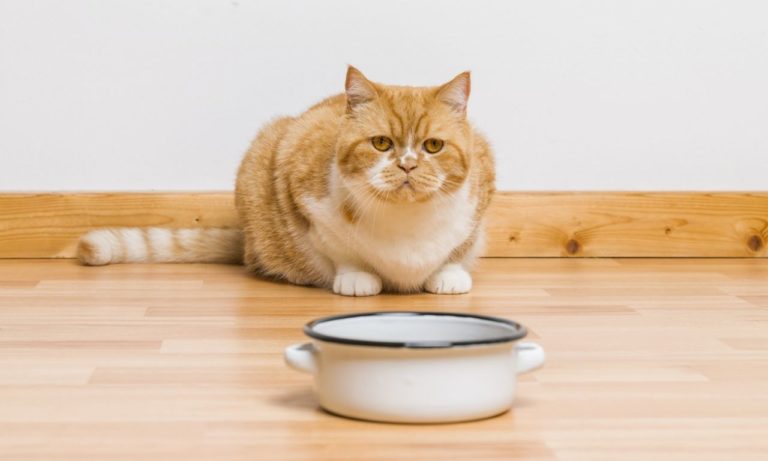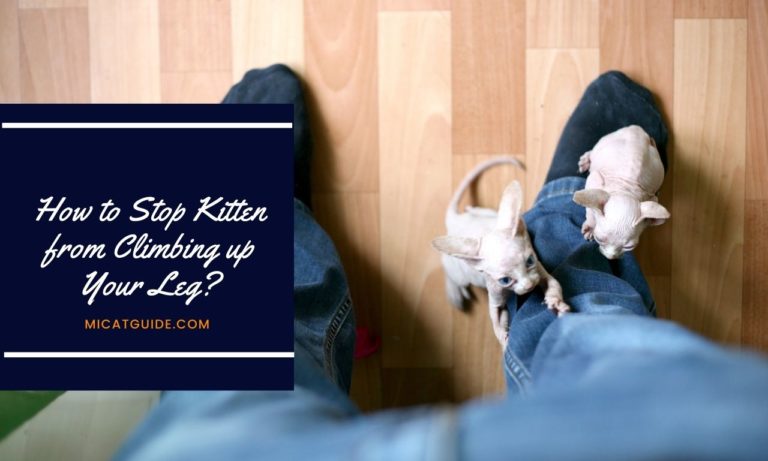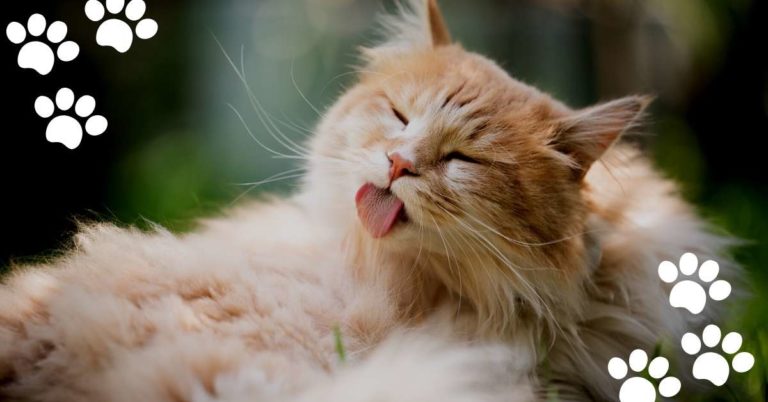Is Peppermint Oil Safe For Cats? (Safe Fleas Fighter?)
No, peppermint oil is not safe for cats. Peppermint oil can be toxic and even fatal to cats if ingested in large quantities, as it has been known to cause liver failure in cats.
In addition, peppermint oil can also irritate or burn a cat’s skin and eyes if applied topically. Therefore, owners should avoid using any products containing peppermint oil on or around cats. However, the use of peppermint oil can be beneficial when used safely and correctly in other pet-related contexts.
Here in this blog post, I’ll be exploring why peppermint oil is not safe for cats and what happen if cats lick or breathe in the scent of peppermint oil. I’ll also be going into what owners should do if they believe their cat has ingested or come into contact with peppermint oil. Finally, I’ll discuss why some people use peppermint oil for fleas on cats.
Is Peppermint Oil Toxic to Cats?
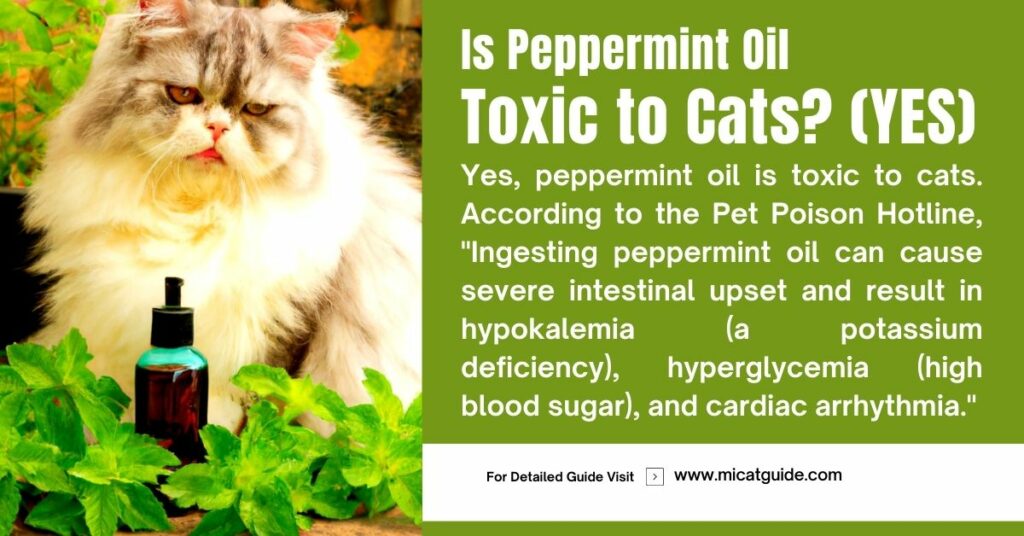
Yes, peppermint oil is toxic to cats. According to the Pet Poison Hotline, “Ingesting peppermint oil can cause severe intestinal upset and result in hypokalemia (a potassium deficiency), hyperglycemia (high blood sugar), and cardiac arrhythmia.”
However, different studies say different things about it. Some say that it is only mildly toxic and that ingesting a small amount will only cause minor problems like vomiting and diarrhea. Others say that it can be fatal if ingested in large quantities. So, what’s the truth?
Well, the fact is that peppermint oil can be toxic to cats, but it depends on the dosage. In small amounts, it may only cause minor problems, but in larger doses it can be fatal. It’s always best to err on the side of caution and keep any products containing peppermint oil out of reach of your cat.
Interesting Read: Is Sage Essential Oil Safe For Cats?
Why Peppermint Oil is Not Safe for Cats?
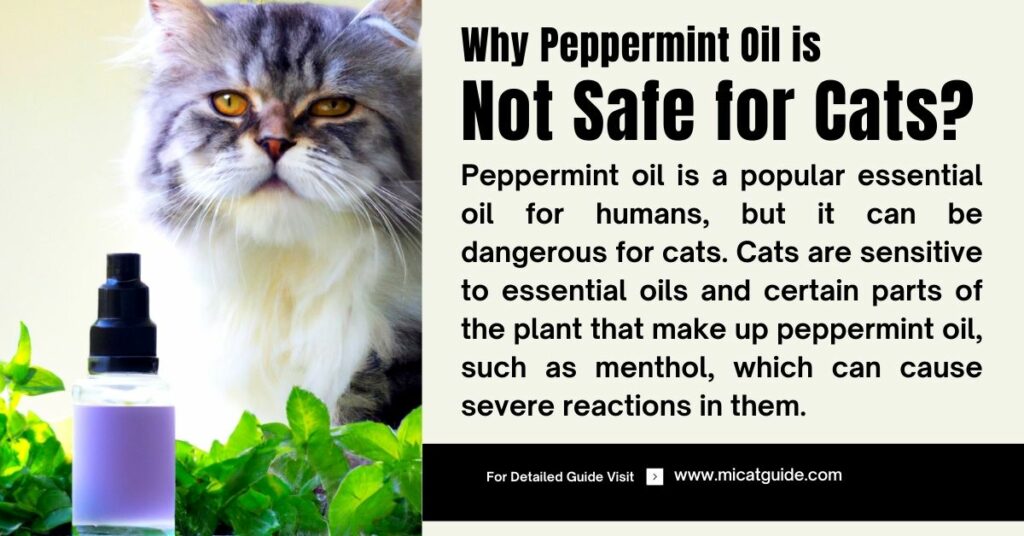
I know I’ve already mentioned why peppermint oil is not safe for cats, but let’s take a look at some of the specifics.
1. The Strong Smell
Peppermint oil has a very strong scent which can cause discomfort for cats. The smell is so strong that it can even be overwhelming for humans. In some cases, cats may experience breathing problems or coughing when exposed to the scent of peppermint oil.
2. It Contains Menthol
Menthol, a compound found in peppermint oil, can be toxic to cats if ingested. Menthol can cause vomiting, diarrhea, confusion, and even seizures in cats if ingested in large amounts. A study showed that even a small amount of menthol could cause severe gastrointestinal distress in cats.
3. It is an Irritant
Peppermint oil can be an irritant to cats if it comes into contact with their skin or eyes. This can cause redness and swelling in the affected area. In some cases, this can even lead to chemical burns. A study found that even a small amount of peppermint oil on a cat’s skin could cause redness and inflammation.
4. It Can Be Fatal
Ingesting too much peppermint oil, or any essential oil for that matter, can be fatal to cats. A study from the American Journal of Veterinary Research showed that ingesting large amounts of peppermint oil could cause liver failure in cats.
You can also read: Is Chamomile Essential Oil Safe For Cats?
Is Peppermint Oil Safe for Cats to Smell/Breathe?
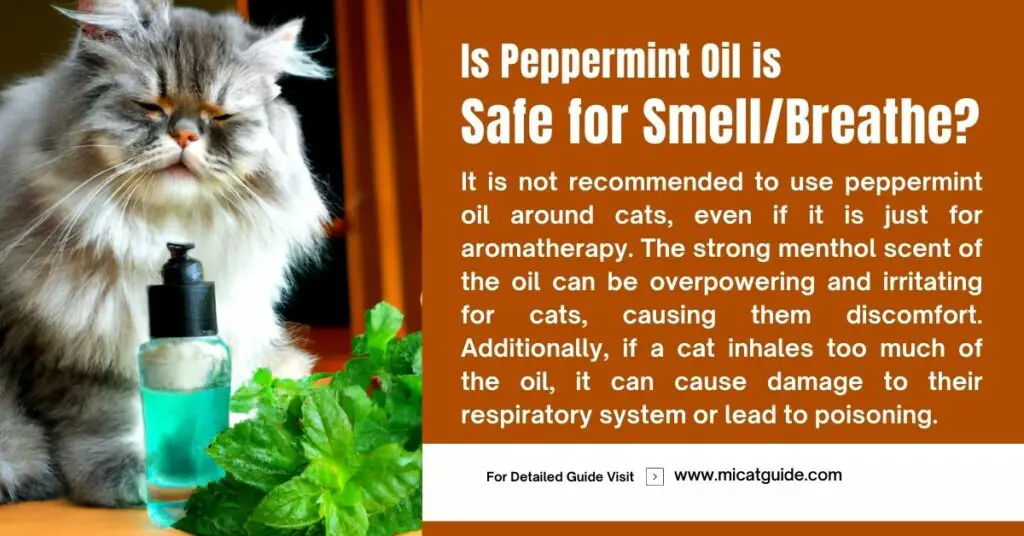
As any pet owner knows, keeping your home clean and free of pet odors can be a challenge. Not only do you have to contend with regular cleaning, but you also have to be vigilant about using products that are safe for your pets.
This is especially true when it comes to essential oils, which can be harmful if used incorrectly. One of the most popular essential oils is peppermint oil, which is often used to freshen the air and deter pests.
However, peppermint oil can also be dangerous for cats if they inhale it directly. The strong scent can irritate their lungs and cause breathing problems. In severe cases, it can even lead to an overdose.
For this reason, it’s important to use peppermint oil sparingly around cats and to make sure that they have a safe place to retreat from the strong scent if necessary.
Symptoms of Peppermint Oil Poisoning in Cats
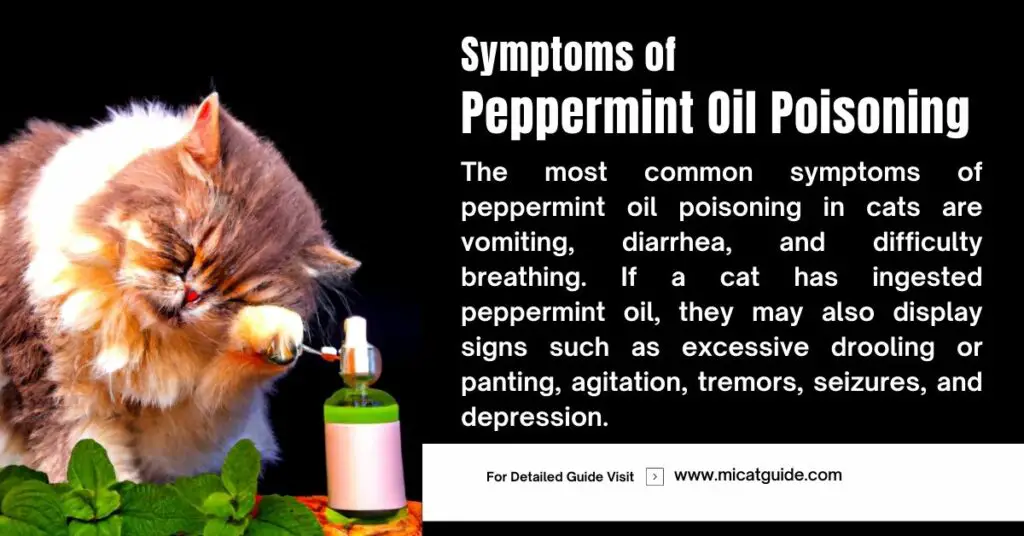
If your cat has ingested peppermint oil, the first thing you should do is call your veterinarian. Peppermint oil can be toxic to cats, and ingestion can lead to gastrointestinal upset and central nervous system depression. Symptoms of toxicity include:
- Vomiting
- Diarrhea
- Drooling
- Lethargy
- Tremors
If you think your cat has ingested peppermint oil, it is important to seek veterinary care immediately. Your veterinarian will likely recommend decontamination measures such as inducing vomiting or giving your cat a laxative.
In severe cases, hospitalization may be necessary. With prompt treatment, most cats recover from peppermint oil toxicity without any lasting effects.
What to Do If Your Cat Has Ingested Peppermint Oil?

Now that you know why peppermint oil is not safe for cats, what should you do if your cat has ingested it?
1. Seek Veterinary Attention
If you think your cat has ingested peppermint oil, seek veterinary attention as soon as possible. Your vet will be able to assess the level of toxicity and provide treatment as necessary.
2. Monitor Your Cat
If your cat has ingested a small amount of peppermint oil, keep an eye on them for signs of discomfort or distress. Symptoms such as vomiting, diarrhea, confusion, and seizures may indicate that the peppermint oil has caused toxicity in your cat.
3. Keep Peppermint Oil Out of Reach
It’s always best to keep any products containing peppermint oil out of reach of your cat. This will help ensure that your pet stays safe and healthy.
Peppermint Oil Vs. Cat Fleas – Revealing The Truth!

The scent of peppermint oil is often used to repel fleas from cats. But does it really work? While some studies have shown that peppermint oil can be effective in repelling fleas, the results have been mixed and there’s no definitive answer yet.
However, most experts agree that while the smell of peppermint oil may be unpleasant to cats, it does not have a long-term effect on fleas. In other words, peppermint oil may work temporarily, but it won’t get rid of the fleas for good.
If you’re looking for an effective way to control fleas on your cat, talk to your veterinarian about options such as flea collars, topical treatments, or oral medications. These solutions are designed to kill fleas and provide long-term protection.
What Vet Recommends on Peppermint Oil Use for Cats?

Most veterinarians do not recommend using peppermint oil on cats due to its potential toxicity. While it may be effective in repelling fleas, the risk of adverse reactions is too great.
To make this concept real clear I talked to my vet to know what he really suggests me while using peppermint oil around cats. He suggested that I should use it as a short-term remedy, avoiding direct contact and making sure cats have a safe place to retreat from the strong scent if necessary.
It is also best to talk to your veterinarian about the safest and most effective flea control options for your cat before attempting any home remedies. Your vet can provide advice on which products are safe and effective, as well as recommendations for preventing future infestations.
By following these recommendations, you can keep your pet safe and healthy while keeping fleas away!
The Bottom Line
In summary, peppermint oil is not recommended for cats due to its potential toxicity. While it may be effective in repelling fleas temporarily, it is important to use it carefully and consult with your veterinarian before using it on your cat.
For long-term flea control, there are many safe and effective products available. Talk to your vet about the best solution for your pet. With the right precautions and treatments, you can keep your cat safe from peppermint oil toxicity and other flea-related issues.


